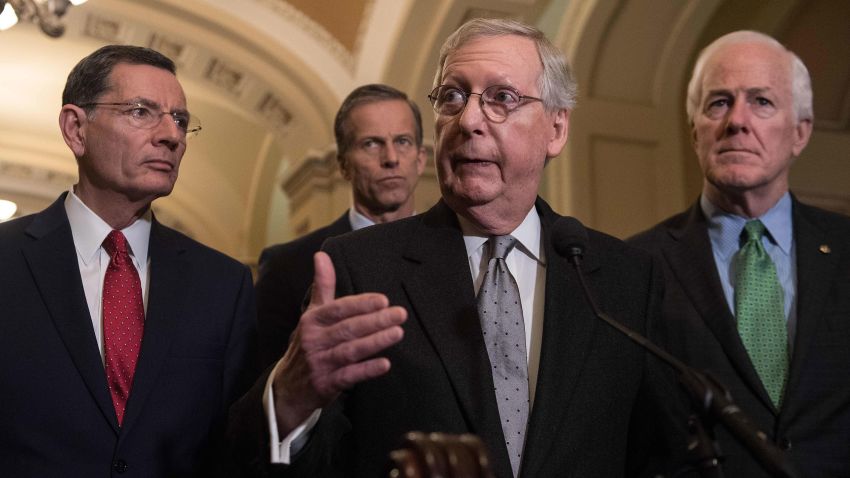House Republicans on Monday open the next act of their Washington farce, desperately searching for a speaker after ousting the incumbent and rejecting two would-be replacements while still clueless about how to dig out of the crisis.
Congress has seen impeachments, fiscal cliffs, government shutdowns and even an insurrection, but the modern Republican Party is surpassing itself with a debacle that is embarrassing senior party leaders and threatens to damage the House GOP’s hopes of saving and expanding upon its tiny majority in 2024. Far from tackling critical bills needed to fund the government, the leaderless House can’t do the basics, like pass a resolution condemning the Hamas attacks in Israel.
At least nine new candidates have signed up to run for speaker ahead of a new selection process this week after Judiciary Chairman Jim Jordan folded his futile bid for the job on Friday, following Majority Leader Steve Scalise the week before. The uprising that began nearly three weeks ago with the toppling of Speaker Kevin McCarthy has now weakened three of the most powerful figures in the House GOP. Perhaps a newcomer can change the calculations of the extremists who opposed McCarthy and Scalise and the more moderate battleground district members who doomed the bulldozing Jordan. But there’s no sign yet any of them can win the 217 votes needed in the full chamber to claim the top job. And more importantly, for whoever eventually wins the gavel, the task of making the House a functional legislative body looks impossible after weeks of GOP infighting that cultivated fresh grievances and demands for vengeance.
“You know, getting 217 is obviously going to be very difficult and is the sort of Rubik’s Cube of the answer to all of this,” Ohio Rep. Mike Turner, chairman of the House Select Committee on Intelligence, said on CNN’s “State of the Union” on Sunday.
Twisting colored squares together in the right order seems simple by comparison with attempts to unite a House Republican conference unable to comprehend how clownish it looks. Republicans, determined to fight a civil war over fractures in the conservative movement, seem oblivious to the degenerating global stability all around them or the shutdown threat directly in front of them.
The vacuum is rendering one branch of the US government inoperable, since the Senate can’t pass laws without the other chamber. “We need (a speaker) because the House can’t do anything without a speaker,” Senate Republican leader Mitch McConnell of Kentucky said on CBS’ “Face the Nation” Sunday.
The imbroglio is far more serious than the classic congressional drama wherein lawmakers procrastinate and work through their political rituals, and then finally get their acts together. In a practical sense, the absence of a speaker means the House cannot support Israel in accordance with a new aid request from President Joe Biden. A critical and bitter debate over new Ukraine funding – $60 billion of which was requested by Biden last week – cannot begin. Before long, the blocked US lifeline could have grave consequences in Ukraine’s war for survival and boost Russian President Vladimir Putin, who is betting US resolve will wane – not a bad wager considering increasing GOP resistance to defending the democratic government in Kyiv.
But forget reverberations overseas. The House meltdown could soon begin to harm millions of Americans. The GOP has wasted three of the precious weeks that it had to solve a spending showdown that could shut down the government by the middle of November. Even if the party suddenly moves quickly toward choosing a new leader, it’s unlikely much serious work gets done this week either.
What the vacant speakership says about the GOP
The empty speaker’s chair offers an eloquent metaphor for how internal political chaos is compromising American leadership. It’s also threatening the more-than-two-centuries-long experiment in self-government by the people that relies ultimately on no one getting everything they want but accepting incremental change. That’s a concept that the modern GOP seems to reject – as evidenced by the claims of Donald Trump and many of his acolytes in the House that they have the right to rule even though the former president’s bid for a second term was rejected by voters in 2020.
The House Republican conference is showing that it cannot even compromise with itself, let alone construct a unified position before eventually accepting the trade-offs that will be needed in dealing with a Democratic-run Senate and White House. Whichever Republican finally wins the speakership will face similar questions to the ones that eventually cost McCarthy his dream job – namely whether to indulge far-right Republicans with extreme spending cuts that the White House and the Senate will never accept, or to avert a government shutdown by advancing stopgap funding with some Democratic votes. Unless a new speaker can change the dynamic, their tenure risks being even shorter than that of the California Republican.
A new speaker will also be hampered by the reality that chaos and a neutered government are a welcome outcome for many grassroots Republicans in a party transformed by Trump. Many of these lawmakers have perfected the extremism that hedges against primary challenges and the cacophony that pleases the ratings-driven demands of conservative media. Influence in the GOP is no longer bought by years of service that paves the way for committee chairmanships. Florida Rep. Matt Gaetz, who led the eight Republicans who voted to can McCarthy, understands the equation well – which is one reason why senior figures bemoaning the need to “govern” aren’t persuading rabble-rousing members. The most obvious representative of this style of stunt politics Republicanism is Trump – who, despite being impeached twice, falsely claiming the 2020 election was stolen and facing four criminal trials, is the runaway front-runner for the GOP’s 2024 presidential nomination.
Embarrassed GOP leaders plea for an end to the mess
Sheer fatigue in the House GOP may create an opening for a candidate who could become a weak speaker with no national name recognition but who could attract the least rancor from across the divided conference. Until then, serious Republican legislators in the House only have the power to express dismay as America’s enemies delight in watching US democracy founder.
“This is probably one of the most embarrassing things I’ve seen because if we don’t have a speaker of the House, we can’t govern. And every day that goes by, we’re essentially shut down as a government,” House Foreign Affairs Chairman Michael McCaul, a Texas Republican, said on ABC News’ “This Week.”
McCarthy, who supported Jordan but is now backing House Majority Whip Tom Emmer, warned on NBC’s “Meet the Press” that the situation cannot be allowed to endure much longer. “This is embarrassing for the Republican Party. It’s embarrassing for the nation, and we need to look at one another and solve the problem,” the former speaker said.
Emmer is among nine GOP candidates seeking to lock down votes ahead of an expected secret ballot to pick a speaker nominee on Tuesday. The Minnesota Republican’s problem, however, is much like McCarthy’s – he is likely to struggle to win the support of the far-right House Freedom Caucus that reviles the GOP leadership team.
The other members throwing their hat into a ring that does not include a single woman are Reps. Kevin Hern of Oklahoma, who chairs the influential Republican Study Committee; Jack Bergman of Michigan, a mainstream conservative and Marine veteran; Austin Scott of Georgia, who launched a last-minute bid against Jordan last week but quickly dropped out; Byron Donalds of Florida, a rising star Freedom Caucus member and one of the few Black Republicans in Congress; Mike Johnson of Louisiana, the GOP conference vice chairman; Pete Sessions of Texas, a congressional veteran who lost his seat in 2018 and soon returned to represent another one; Dan Meuser, a former Pennsylvania secretary of revenue and member of the Problem Solvers Caucus; and Gary Palmer of Alabama, who chairs the Republican Policy Committee.
Newt Gingrich – a former Republican speaker who is credited with inventing back in the 1990s the highly partisan style of hardball governing preferred by today’s GOP – said party leaders must choose anyone who can get to a House majority regardless of who they are, or the charade could go on for weeks. And he warned with critical government funding and budget bills looming, the GOP doesn’t just have to unite on a new speaker but on a new period of unified governance.
“That 217 has to be committed not just to elect a speaker, but to stick together for the next five or six months. They got big decisions coming down the road,” Gingrich told Fox News. “There’s a very real danger that they’ll elect somebody, and three or four or five weeks from now, you’re going to have a group of people blow up and decide to go back into the same mess.
“So they need to pick somebody to get stability.”
Putting aside the irony of those words coming from the firebrand Georgia Republican, the House GOP has shown over the last three weeks that stability is the last thing the party is able, or even wants, to deliver.
























